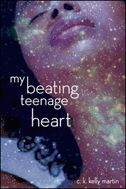 Anyway, it happens that the Kirkus review of My Beating Teenage Heart is essentially a turkey review. Kirkus didn't go so far as to include a turkey icon but I'll do them the favour of adding it here. I'm guessing it's the same Kirkus reviewer who didn't like The Lighter Side of Life and Death because they both have an obvious fondness for ending on zingers.
Anyway, it happens that the Kirkus review of My Beating Teenage Heart is essentially a turkey review. Kirkus didn't go so far as to include a turkey icon but I'll do them the favour of adding it here. I'm guessing it's the same Kirkus reviewer who didn't like The Lighter Side of Life and Death because they both have an obvious fondness for ending on zingers. Here's the last sentence of The Lighter Side of Life and Death review by Kirkus:
“For a summer novel focusing on love and lust, this barely causes the temperature to rise.”
And here are the closing words of their My Beating Teenage Heart review:
Now, we're all aware that it's par for the course that you'll be subjected to negative reviews sometimes if you're writing or performing so, although I would've much preferred a positive review, it's not the thumbs down in itself that particularly bothers me about the Kirkus review. No, it's that reviewer refers to one of the main characters, seventeen-year-old Breckon who feels responsible for the death of his little sister, as sulking and moping.
To me, moping suggests something like the following scenario — a kid who breaks his father's camera (an expensive piece of equipment that he was forbidden to use) is grounded and therefore not allowed to go to the local amusement park with his friends the next day. He's sure they're having an amazing time on the scrambler and tilt-a-whirl while he shuffles around the house, looking bored and feeling sorry for himself for missing out. Personally I'd consider that moping and sulking. What I don't feel qualifies as 'sulking' and 'moping' are grieving, suicidal thoughts and clinical depression, you know? There's a crucial distinction to be made there and while we're talking about fiction here, what does this review say to someone who is genuinely experiencing deep grief and/or suffering from depression? That real people don't ever feel this way and if they do their emotions are overwrought? And so those references to moping and sulking in the Kirkus review, they bother me a great deal.
Below are some real life stats and info about suicide, depression and complicated grief that I think it's extremely important to be aware of and take seriously.
Click any of the below to be taken to the original source of the information.
• In the U.S. in 2007, "suicide was the third leading cause of death for young people ages 15 to 24."
• "About 20% of teens will experience teen depression before they reach adulthood. Approximately 5% of teens are suffering from major depression at any one time."
• "Nearly five times as many males as females ages 15 to 19 died by suicide." Overall men are nearly 4 times more likely to die by suicide than women but women attempt suicide 3 times as often as men.
The American Academy of Pediatrics describes the following signs that may signal that a depressed teen may be considering suicide:
According to the American Foundation for Suicide Prevention in an acute crisis (if a friend or loved one is threatening, talking about or making plans for suicide):
•Do not leave the person alone.
•Remove from the vicinity any firearms, drugs or sharp objects that could be used for suicide.
•Take the person to an emergency room or walk-in clinic at a psychiatric hospital.
•If a psychiatric facility is unavailable, go to your nearest hospital or clinic.
•If the above options are unavailable, call 911 or the National Suicide Prevention Lifeline at 1-800-273-TALK (8255) in the U.S.
In Canada young people can call Kids Help Phone at 1-800-668-6868. Other Canadian suicide hotline numbers are available here.















